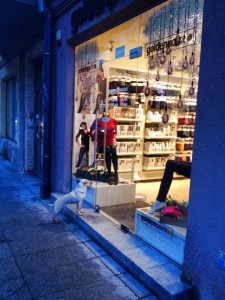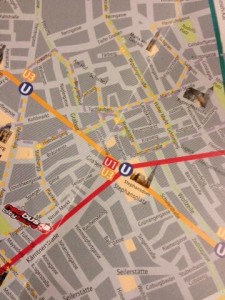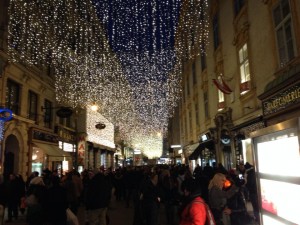Vitrines
My last visit to Vilnius was in 2002. I tend to remember the date of that visit mainly because of the inbuilt “football clock” – there was the Korea & Japan World Cup at the time. That last visit was also for a conference. I was a junior lawyer on the Maltese government’s team negotiating the accession chapters and this was a trip that would discuss competition.
I remember very little of Vilnius itself though since we spent most of the time closed up in the halls and the few times we gave the conference the slip it was to watch such important matches as Italy v. South Korea. I do remember remarking that the young country had not yet been fully impacted by the onslaught of capitalism since its liberation in 1990.
Walking up Gediminas Avenue in 2013 it feels like much more than 10 years have passed. The main road boasts a little of all the familiar names that are ubiquitous in the main cosmopolitan areas of the continent. My eyes shifted to the streets though (it’s actually impossible to keep your eyes off them anyway) and to the elegant passerelle of Lithuanians moving along the avenue.
Niall Ferguson cites consumption as one of the “killer apps” that allowed the West to dominate the rest. Attire and dress played an important part since the industrial revolution insofar as this killer app is concerned. I could not help but reflect on the fact that, along with the shop windows, you had the obvious consequence that a whole nation would dress smartly. Affluence begets affluence so to speak.
The pan-European imprint of the shop window must say something about us, about the European citizen. This is after all the continent that perfected mercantile practices – across the seas, along the canals and on its main thoroughfares. Do our vitrines, our shop-windows, and their changing face say something about us?
I stopped in Vienna on my way back to Luxembourg and having a long stop-over I caught a quick city train into the city. I was blown away by the huge number of Christmas shoppers that jam packed the magnificently lit thoroughfares. I did not venture much beyond St. Stephensplatz but the opulence of the Graben area with its deluxe trade names, its chocolates and sweets, its fur clad ladies marching irritable and irritating poodles … well they spoke to me immediately in the language of a society that was a step or two ahead in the affluenza tables.
Our Malls, our High-Streets, our “fashion” establishments. Do they impose an implicit harmonisation? Even before looking at this phenomenon from a global perspective, is there some conclusion that can be drawn from the European Vitrines? Do our windows have an effect on citizenship?
The window is after all often to be found at the forefront of political events. The angry citizen may vent his rage and frustration on the very shop window that would have contained his wishes just before the particular storm began to brew. Cities that expect riots (remember the G8 series?) will barricade their shop fronts and turn off the light of consumerism until the rage is over. England was once famously described as “a nation of shopkeepers”. Also, we are all too familiar with the lamentations of small shops and shopkeepers as behemoths elbow them out of the high street.
The social reaction to the evolution of shops (and their shop windows) can also probably be gauged as a sign of times. The interaction is (and will) remain mutual. As the shop and its window mutates so will the citizens and their lifestyles.











“Affluenza”, excess, materialism, consumption, consumerism……..these words sicken me. Especially at this time of year.
When I told someone recently that I should have been a lawyer, their immediate reaction was: “Yes, lawyers make a lot of money.” I stared at her.
When I was a child, it didn’t take much to make me happy: books, enough food, some family members, walks, the sea and time, plenty of time, to dream. I could day dream for Malta.
I am still that child albeit that I now have to provide books, enough food and time, plenty of dreaming time, for my children.
Am I naïve? I just want to make the world a better place. I am not interested in just making lots of money.
For every obscenely rich person, there are thousands of destitute people.
And the best things in life ARE free, or nearly free. Rich people do not have a monopoly on beautiful sunsets, landscapes; glorious children; great books, films, art; good friends ………..
What is the great European experiment all about?
“The Union is founded on the values of respect for human dignity, liberty, democracy, equality, the rule of law and respect for human rights, including the rights of persons belonging to minorities.” http://europa.eu/scadplus/constitution/objectives_en.htm
Forget shop windows; are these European values evident in all the 28 countries of the European Union?
What difference has the European Union made to All the Europeans living in the EU, third country nationals, asylum seekers, the rich/poor divide, quality of life for all ……….?
Vilnius is so much nicer the farther you get away from affluent Gediminas prospektas, when you get to the areas with the wooden houses like Zverynas (only a short walk from Gediminas) or when you stroll through the fabulous Vingis Park.